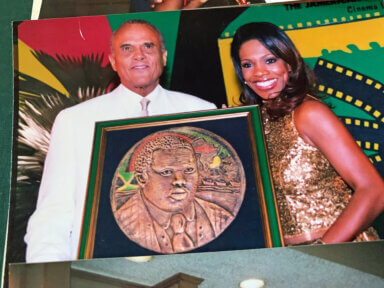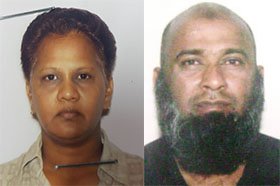‘Jamaica Farewell’— Ode to an iconic actorvist

Back in the 1950s Harry Belafonte ignited a calypso craze in America when he released an entire album full of catchy tunes titled “I Do Adore Her,” “Jump In The Line,” “The Banana Boat Song” “Brown Skin Gal” “Come Back Liza” “Man Smarter” and the somber “Jamaica Farewell.”
The songs captivated Americans to listen to a genre which had been virtually ignored by western ears.
The music was infectious, lively and rhythmic.
“Calypso” topped the Billboard chart shortly after release in 1956 and remained at the top for 31 weeks.
“Calypso” is also reputed the first album by a single artist to sell more than a million copies.
Its success enabled better accountability for record sales and even a Grammy Awards annual celebration for achievement in music.
While most of the compositions stirred festive carnival revelry, the latter paid tribute to an island he seemed to yearn for and sincerely reminisced.
“Sad to say I’m on my way
Won’t be back for many a day
My heart is down
My head is turning around
I had to leave a little girl in Kingston town”
“Jamaica Farewell”
There in Jamaica, Belafonte is revered as the island’s most vociferous promoter.
Although he was born on the island of Manhattan, he never missed an opportunity to spread love about the Caribbean hamlet his mother Melvine was born or the paradise he spent much of his youth.
Jamaicans regard him as their native son with more than a few willing to debate and argue that the Harlem-born trailblazer was actually conceived in the same St. Ann’s parish as Marcus Garvey, the island’s first national hero and Robert Nesta Marley, the avowed king of reggae.
Needless to say April 25 when Belafonte died of congestive heart failure at age 96, a spokesperson at the highest level of government commented on the legacy left by their adopted native son.
Olivia Grange, minister of Culture, Gender, Entertainment and Sport described Belafonte as a “voice, face and inspiration for Black people everywhere.”
The official said Belafonte was an “important promoter of our folk music” also acknowledging that Belafonte never missed an opportunity to ‘sell’ Jamaica throughout the world.
The minister added that the singer used “folk music to become the biggest star in music at one point.”
In fact, Belafonte emerged the highest paid Black man in the world.
During his career, he won three Grammy Awards and was credited with helping to organize the USA for Africa project out of which came the all-star recording ‘We Are the World’ in 1985 that raised money to fight famine in Africa.
On the day Belafonte joined the ancestors, social media regaled his trailblazing impact on television — Belafonte was the first Black entertainer to win television’s highest honor, an Emmy award.
In addition, podcasts lauded the handsome, charismatic and charming young man who caused women to swoon from the first time he appeared onscreen in 1953.
Recollections of how Hollywood capitalized on his good-looks to garner new audiences at the box-office dominated prime time broadcasts.
Cable news outlets integrated scenes from Belafonte movies “Carmen Jones,” (1954) “Island In The Sun” (1957) “Buck & The Preacher” (1972). “Uptown Saturday Night” (1974) and others to provide lead-in visuals to an obituary.
Tuesday, public radio focused on Belafonte’s early years in Harlem, his military service in the US Navy and his forays to the island he claimed.
While politically progressive medium preferred to reflect on the celebrity support Belafonte recruited on behalf of Dr. Martin Luther King Jr. when he encouraged his colleagues — conservatives and liberals, Democrats and Republicans to join the 1963 march in Washington D.C.
Vinette K. Pryce with Harry Belafonte.Courtesy Vinette K. Pryce
Actors Charleston Heston, Tony Francioso, Rita Moreno, Tony Curtis, Sammy Davis Jr. Paul Newman, Joanne Woodward, Diahann Carroll, Sidney Poitier, James Garner, Marlon Brando and others locked arms singing “We Shall Overcome.”
Acclaimed an EGOT (Emmy, Grammy, Oscar, Tony winner), The Apollo Theater marquee lit in his honor with the words Rest In Peace.
It seemed everyone went wild about Harry.
But it was Harry who was wild about seeking justice, embracing activism, fighting racism, empowering Black youths, fomenting optimism for the future and championing the cause for a long list of social inequities.
Belafonte was not content with following the celebrity status quo. From the 1960s he set aside his entertainment career to focus on exposing the warts of American society.
He used his platform to bring awareness to issues concerning the poor and disfranchised.
However, Belafonte never fully disengaged from entertainment, in 1995 he shared top billing with John Travolta for “White Man’s Burden” and collaborated with Spike Lee in 2018 for “Black KKKlansman.”
Last year to mark his 95th birthday, Jamaica’s Prime Minister Andrew Holness announced that a highway will be named in his honor.
As for yours truly, Belafonte was integral to covering the beat.
It was in Harlem where I first encountered the legend.
He enlightened me then about friendships he nurtured during his stint at a drama school.
He talked about his hitch in the US Navy and about his beloved mother.
On an occasion at the Apollo Theater he spoke at length about his involvement in bringing Nelson Mandela to the United States.
The details he imparted resonated as if he was an unsung hero.
There is a treasure trove of unpublicized material still to be revealed.
Privileged to have met him on many occasions, at the former Westbury Music Fair he enthralled me playing various percussion instruments.
Belafonte was a total performer.
At the Jamerican Film & Music Festival in Montego Bay, Jamaica, he mingled with everyone. He was to be presented the Marcus Garvey Award but took time to talk with everyone about his memories of Browns Town.
And at City College where I last saw the nonagenarian, Belafonte pulled out all the stops, speaking truth to power about President Barack Obama, Mayor David N. Dinkins, Beyonce, police brutality and other issues of the day.
Most memorable too was when the actorvist keynoted a tribute to MLK at the Brooklyn Academy of Music.
On that frigid holiday, after delivering a superlative address he received a standing ovation.
Numerous tributes have already detailed his attributes. Many more will come.
In a press release, Grange explained that in Jamaica Belafonte was honored in 2018 “for outstanding contribution in the field of music.”
She said he was bestowed with the nation’s fourth highest award, the Order of Merit.
“Belafonte (whose original name was Bellanfanti before his father changed the family name) was born in New York in 1927.
His mother, Melvine, was born in Jamaica.
She moved back to Jamaica in 1936 with Harry and his younger brother, but returned here soon afterwards leaving the boys to be looked after by relatives and to immerse in the Jamaican culture.
They rejoined her in New York in 1940.
Belafonte went on to study Black history at the urging of his shipmates in the US Navy and worked alongside Martin Luther King Jr. in the civil rights movement.”
In conclusion she added that “the government of Jamaica and the nation has offered condolences to his widow Pamela, children, grandchildren and friends.”





